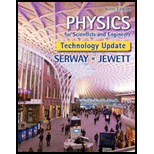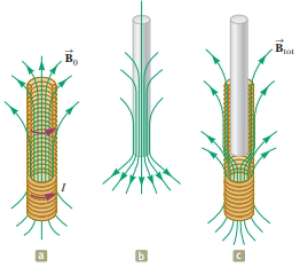
Review. A fundamental property of a type 1 superconducting material is perfect diamagnetism, or demonstration of the Meissner effect, illustrated in Figure 29.27 in Section 29.6 and described as follows. If a sample of superconducting material is placed into an externally produced magnetic field or is cooled to become superconducting while it is in a magnetic field,
A vertical solenoid with a length of 120 cm and a diameter of 2.50 cm consists of 1 400 turns of copper wire carrying a counterclockwise current (when viewed from above) of 2.00 A as shown in Figure P31.48a. (a) Find the magnetic field in the vacuum inside the solenoid. (b) Find the energy density of the magnetic field. Now a superconducting bar 2.20 cm in diameter is inserted partway into the solenoid. Its upper end is far outside the solenoid, where the magnetic field is negligible. The lower end of the bar is deep inside the solenoid. (c) Explain how you identify the direction required for the current on the curved surface of the bar so that the total magnetic field is zero within the bar. The field created by the supercurrents is sketched in Figure P31.48b, and the total field is sketched in Figure P31.48c. (d) The field of the solenoid exerts a force on the current in the superconductor. Explain how you determine the direction of the force on the bar. (e) Noting that the units J/m3 of energy density are the as the units N/m2 of pressure, calculate the magnitude of the force by multiplying the energy density of the solenoid field times the area of the bottom end of the superconducting bar.
Figure P31.48

Want to see the full answer?
Check out a sample textbook solution
Chapter 32 Solutions
Physics for Scientists and Engineers, Technology Update (No access codes included)
- After the countdown at the beginning of a Mario Kart race, Bowser slams on the gas, taking off from rest. Bowser get up to a full speed of 25.5 m/s due to an acceleration of 10.4 m/s2.arrow_forwardThe drawing in the image attached shows an edge-on view of two planar surfaces that intersect and are mutually perpendicular. Side 1 has an area of 1.90 m^2, Side 2 has an area of 3.90 m^2, the electric field in magnitude is around 215 N/C. Please find the electric flux magnitude through side 1 and 2 combined if the angle (theta) made between the electric field with side 2 is 30.0 degrees. Thank you.arrow_forwardThe drawing in the image attached shows an edge-on view of two planar surfaces that intersect and are mutually perpendicular. Surface (1) has an area of 1.90 m^2, while Surface (2) has an area of 3.90 m^2. The electric field in magnitude of 215 N/C. Please find the magnitude of the electric flux through surface (with both 1 and 2 combined) if the angle (theta) made between the electric field with surface (2) is 30.0 degrees. Thank you.arrow_forward
- The drawing in the image attached shows an edge-on view of two planar surfaces that intersect and are mutually perpendicular. Surface (1) has an area of 1.90 m^2, while Surface (2) has an area of 3.90 m^2. The electric field in magnitude of 215 N/C. Please find the magnitude of the electric flux through surface (with both 1 and 2 combined) if the angle (theta) made between the electric field with surface (2) is 30.0 degrees. Thank you.arrow_forwardAccording to a grade 11 Physics SPH3U course Kinematics, Dynamics, and Energy answer the following questionarrow_forwardAccording to a grade 11 Physics SPH3U course Kinematics, Dynamics, and Energy answer the following questionarrow_forward
- According to a grade 11 Physics SPH3U course Kinematics, Dynamics, and Energy answer the following questionarrow_forwardThree point-like charges in the attached image are placed at the corners of an equilateral triangle as shown in the figure. Each side of the triangle has a length of 38.0 cm, and the point (C) is located half way between q1 and q3 along the side. Find the magnitude of the electric field at point (C). Let q1 = −2.80 µC, q2 = −3.40 µC, and q3 = −4.50 µC. Thank you.arrow_forwardThree point-like charges are placed as shown in the attach image, where r1 = r2 = 44.0 cm. Find the magnitude of the electric force exerted on the charge q3. Let q1 = -1.90 uC, q2 = -2.60 uC, and q3 = +3.60 uC. Thank you.arrow_forward
- The drawing attached shows an edge-on view of two planar surfaces that intersect and are mutually perpendicular. Surface (1) has an area of 1.90 m², while Surface (2) has an area of 3.90 m². The electric field in magnitude of 215 N/C. Find the magnitude of the electric flux through surface (1 and 2 combined) if the angle theta made between the electric field with surface (2) is 30.0 degrees. Thank you.arrow_forwardA car driving at 27m/s veers to the left to avoid a deer in the road. The maneuver takes 2.0s and the direction of travel is altered by 20 degrees. What is the average acceleration during the constant speed maneuver? Do this in accordance with the example in the chapter.arrow_forwardNo No No Chatgpt pls will upvotearrow_forward

 Modern PhysicsPhysicsISBN:9781111794378Author:Raymond A. Serway, Clement J. Moses, Curt A. MoyerPublisher:Cengage Learning
Modern PhysicsPhysicsISBN:9781111794378Author:Raymond A. Serway, Clement J. Moses, Curt A. MoyerPublisher:Cengage Learning Physics for Scientists and EngineersPhysicsISBN:9781337553278Author:Raymond A. Serway, John W. JewettPublisher:Cengage Learning
Physics for Scientists and EngineersPhysicsISBN:9781337553278Author:Raymond A. Serway, John W. JewettPublisher:Cengage Learning Physics for Scientists and Engineers with Modern ...PhysicsISBN:9781337553292Author:Raymond A. Serway, John W. JewettPublisher:Cengage Learning
Physics for Scientists and Engineers with Modern ...PhysicsISBN:9781337553292Author:Raymond A. Serway, John W. JewettPublisher:Cengage Learning Physics for Scientists and Engineers, Technology ...PhysicsISBN:9781305116399Author:Raymond A. Serway, John W. JewettPublisher:Cengage Learning
Physics for Scientists and Engineers, Technology ...PhysicsISBN:9781305116399Author:Raymond A. Serway, John W. JewettPublisher:Cengage Learning Principles of Physics: A Calculus-Based TextPhysicsISBN:9781133104261Author:Raymond A. Serway, John W. JewettPublisher:Cengage Learning
Principles of Physics: A Calculus-Based TextPhysicsISBN:9781133104261Author:Raymond A. Serway, John W. JewettPublisher:Cengage Learning





